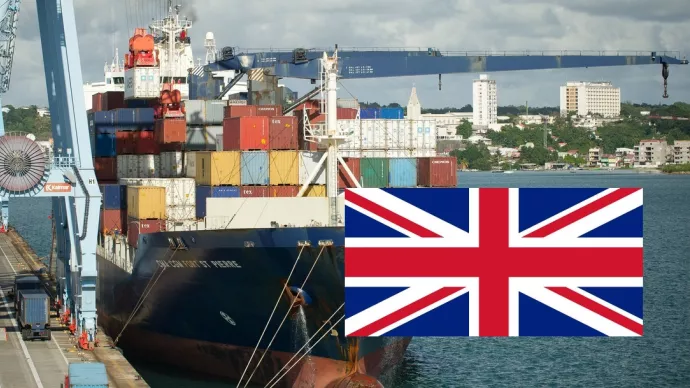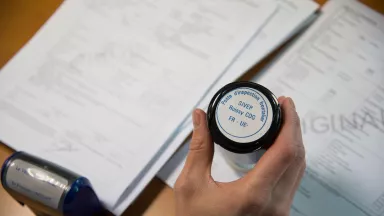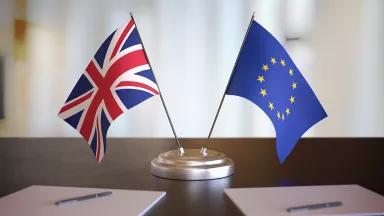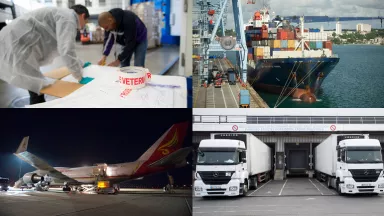
Brexit-related issues for the agriculture, agrifood, fisheries and forestry sectors
Partager la page
Importers of agricultural, agrifood, wood products ans products of the sea, live animals or animal genetic material from the United Kingdom
Since 1 January 2021, imports have been subject to the terms of trade and cooperation agreement (implemented on a provisional basis prior to its ratification by the European Union on 29 April 2021). The agreement does not however exempt businesses from controls, notably sanitary and phytosanitary (SPS), at the border. This means that the rules for importing goods (plants, plant products, animal feed and animal products), live animals and genetic material from the United Kingdom have changed.
The new formalities might entail, lengthier journey times for goods that you will need to take into account (new formalities to be observed, longer transportation times for goods at least in the short term, etc.). Human and physical resources have also been reinforced in order to apply the controls at the border and ensure logistics continuity for import flows from the United Kingdom.
The French inspection services have taken the necessary steps for continuity of import logistics flows from the United Kingdom, in particular with regard to human and physical resources enabling implementation of border checks.
What do the sanitary and phytosanitary (SPS) controls on imports involve ?
SPS import controls applied to consignments from third countries are carried out at the border at the first point of entry into the EU. The checks must be conducted in specific inspection facilities notified by Member States to the European Commission – border control posts – the construction of which is the responsibility of the organisations managing the entry points (port concession holders, for example). These inspections are determined by EU regulations and are carried out ahead of customs clearance procedures. They involve a documentary check on the (phyto)sanitary certificate, to which may be added identity verifications and physical inspections requiring physical presentation of the consignment at the border control post (on a random basis or systematically in the case of certain trade flows, e.g. live animals).
To find out more, you can download a presentation of the French general directorate for food (DGAL) on SPS controls on goods imported from United Kingdom :
- More information on SPS import controls;
- More information on the (phyto)sanitary requirements applicable to imports from third countries to the EU can be found on the Impadon website;
- The model sanitary certificates for entry of livestock and animal products into the European Union from the United Kingdom are those currently in force for all third countries. They are available on TRACES-NT (Certificates / EU Import / Blank Certificates).
For more information, you can download a leaflet on SPS controls on goods imported from United Kingdom.
How is the French Ministry of Agriculture and Food Sovereignty preparing for the possible impacts of Brexit on sanitary and phytosanitary controls?
The French Ministry of Agriculture and Food Sovereignty has prepared for the deployment, starting on 1st January 2021, of SPS border controls for flows to and from Great Britain.
Where imports are concerned, the Ministry has worked in close conjunction with the organisations managing the entry points along France’s Channel/North Sea coast with a view to setting up new border inspection posts or resizing existing facilities. The Ministry’s human resources have been enhanced for the deployment of new import control activities.
Where exports are concerned, the Ministry is strengthening certification services at regional level (SRALs) and in the French départements (DD(CS)PPs), and is working in partnership with FranceAgriMer to organise training sessions for exporters and its own staff, with particular emphasis on “first-time” exporters who have been trading with the United Kingdom but have never exported to a non-EU third country.
What types of SPS controls apply to products travelling via the “landbridge” between the continental European Union and Ireland?
The “Landbridge” refers to road haulage between Ireland and the continental European Union going via the United Kingdom. This therefore concerns trade in intra-EU goods involving road transit through a third country for which sanitary controls will be required at the end of the transition period on 1st January 2021.
Exports: For goods despatched from the European Union to Ireland:
Please go to the Irish government's website.
UK requirements for these transits are detailed here : https://www.gov.uk/guidance/transiting-animals-and-animal-products-through-great-britain#eu-to-gb-to-eu-transits-from-april-2021
From January 31, 2024, a transit health certificate will be required for high and moderate-risk animal products from one Member State to another, transiting through Great Britain. Prenotification to the British authorities is also required.
For plant products, a simple transit declaration will be required (no phytosanitary certificate or pre-notification is necessary).
Imports: For imports from Ireland to the continental European Union:
The nature of the border controls will vary according to the products concerned:
- No checks on plants or on animal feed of non-animal origin;
- Document checks as follows:
- Based on the sanitary certificate for intra-EU flows where required (e.g. live animals);
- Based on TRACES prenotification for other goods;
- For certain categories of goods (animal by-products): a seal check at the border inspection post.
For more information, you can download the information sheet on the "
What does import certification for fisheries products involve?
Among the most important checks on imports of seafood products is the requirement prior to customs clearance of a catch certificate relating to the consignment(s) of such products when imported into EU territory.
A catch certificate, for imports or reimports, is the document with which the UK authorities attest to the legality of the conditions in which the imported products have been caught. It is authenticated by the precise identification and signature of the authorities notified to the European Commission for that purpose.
Verification of the existence and compliance of this certificate for UK imported or reimported fisheries products is essential and must be taken into account and required by the company concerned. It must not omit to notify it in advance to the UK company with which it has made its purchase.
If this certificate is missing or non-compliant, the consequence will be that the consignment or consignments will be blocked by Customs.
What rules apply to operators importing equine animals from Great Britain?
From 1 January 2021 on, you must ensure that you:
1 – Check the designated status of the Border Control Post (BCP) at the destination:
https://agriculture.gouv.fr/ou-sont-effectues-les-controles-sps-aux-frontieres,
2 – Check the opening times of the animal inspection facility,
3 – Arrange for issuance of a Sanitary Certificate (SC) by the UK authorities,
4 – For horses subject to controls at Calais Port or Calais Tunnel: make an appointment on the website
of the DRAAF (Direction régionale de l'agriculture, de l'alimentation et de la forêt / Regional directorate for agriculture, food and forestry): https://www.pas-decalais.gouv.fr/booking/create/51518
5 – Enter a prenotification in the TRACES-NT system, covered by a Common Health Entry Document (CHED/DSCE-A):
• this must state without fail the registration number of the lorry AND the trailer (if a trailer is used),
• and it must also include without fail the numbers of any security seals, if applicable;
• you are strongly advised to scan and attach to the CHED/DSCE-A a copy of the SC as signed by the UK authorities if this is already in the possession of the haulier. In addition to the above, for high health status horses:
• state the type of high sanitary status classification of the horse by indicating the acronym of the document issued in this connection: FEI/RCN/BCN/GNM* in box I.3 of Part I of the CHED/DSCE-A,
• attach without fail to the CHED/DSCE-A the document enabling verification of this status and including identification details for the animal concerned.
6 – If the animals are travelling with straw or hay, ensure that you have the invoice proving its GB or EU
Member State provenance.
7- State the reference number of the CHED/DSCE-A for the customs formalities and take note of the
detailed information available on line concerning SPS controls on imports of animals into the EU from
Great Britain :
https://agriculture.gouv.fr/le-brexit-et-les-controles-sanitaires-et-phytosanitaires
* FEI passport, Racing Clearance Notification, Breeding Clearance Notification, General Notification of Movement
What rules apply to travelling with domestic carnivores (dogs, cats, ferrets)?
For individuals travelling from France to Great Britain accompanied by domestic carnivores:
The UK has not changed its requirements for movements of domestic carnivore, from the European Union to Great Britain, since its exit of the European Union.
Any change in the UK’s requirements with regard to travelling with pets will be communicated on the following website: https://www.gov.uk/bring-pet-to-uk
At this stage, your pet (dog, cat, ferret) must meet the following requirements in the case of non-commercial movements:
- It must be identified (with an electronic microchip).
- It must have a pet passport or have an official veterinary certificate from a third country.
- It must be validly vaccinated against rabies (animals at least 12 weeks old for vaccination at the first time of vaccination against rabies; vaccine protection and validity are established on elapse of a period of at least 21 days).
N.B.: A blood test (rabies antibody titre) will also be necessary if the animal is arriving in the United Kingdom from an “unlisted country”.
N.B.: The pet may be placed in quarantine for a maximum of four months at the owner’s cost if the above requirements are not met.
The number of authorised animals is limited to a maximum of five (unless exempted for domestic carnivores participating in competitions, exhibitions or sports events. In these cases, the owner or the authorised person must present written proof that the animals are in fact registered as participants in an event of one of the above types. Such animals must in this case be over six months old).
Additional important points:
In addition, if your dog is going to Great Britain or Northern Ireland (or to the Republic of Ireland), it must:
- be at least three months old;
- have been treated for parasitic worms (Echinococcus) between 24 and 120 hours prior to arrival, such treatment being recorded in the passport by the administering veterinarian.
Additionally, entry of dogs into the country on private vessels is prohibited in the United Kingdom.
For persons travelling from Great Britain to France or the European Union accompanied by domestic carnivores:
NB : This section does not apply to people travelling to Northern Ireland. The EU rules regarding travelling with domestic carnivores within the EU continue to apply to Northen Ireland.
1/ Since1st January 2021, the "EU pet passport" issued in Great Britain is no longer a valid document for travelling with pets to the EU.
2/ If you are living in Great Britain and travelling with a dog, a cat or a ferret from Great Britain to France, you should comply with the requirements imposed by Regulation (EU) No 576/2013 :
- Make sure your pet is identified by the implantation of an electronic transponder or by a clearly readable tattoo if applied before 3 July 2011.
- Make sure your pet has a valid anti-rabies vaccination (the animal was at least 12 weeks old at the date the vaccine was administered; the period of validity of the vaccination starts not less than 21 days from the completion of the vaccination protocol ; the date of administration of the vaccine does not precede the date of identification).
- Make sure your pet is accompanied by a health certificate issued by an official veterinarian in the UK, together with a proof of vaccination against rabies and a document proving your pet is identified. The health certificate is valid for 10 days from the date of issuance and has to be presented for import checks within these 10 days of validity. The health is valid for a total of four months within the EU and Northern Ireland.
If your pet (e.g. a dog, cat, ferret) has a European Pet Passport (this has not been issued by the UK authorities), you will not need a sanitary certificate signed by the UK veterinary services unless a rabies vaccination (or the booster dose) has been administered in the United Kingdom after 31 December 2020.
Attention : Dangerous dogs are classified in France under 2 categories. The entry of 1st category dogs into French territory is prohibited. Import of category 2 dogs is strictly regulated and subject to administrative obligations. Details for each category are available here
3/ If you are living in the EU (or in Northern Ireland) and returning from Great Britain to the EU with a dog, a cat or a ferret from the Great Britain to France after a temporary movement to Great Britain, you will have to be accompanied by a duly filled-in EU pet passport (not issued in Great Britain). This passport must attest a valid anti-rabies vaccination and has to be presented for import checks.
For more information, you can download
For more details, you can also consult the website of the French Embassy.
I am a UK citizen and work in a regulated profession subject to the oversight of the Ministry of Agriculture and Food
a) I settled in France before 1 January 2021 and hold professional qualifications (acquired in the United Kingdom, a Member State of the European Union or another country belonging to the European Economic Area) in a profession subject to the oversight of the Ministry of Agriculture and Food (e.g. veterinarian, aggressive dog trainer, chicken farmer). Can I continue to work in this profession in France?
Yes, you may continue to carry on your activity in France. Having settled in France before 1 January 2021, your situation is covered by the withdrawal agreement, which provides for the maintenance of rights acquired by UK citizens resident in the European Union, including after 31 December 2020.
b) I hold professional qualifications acquired in the United Kingdom, a Member State of the European Union or another country belonging to the European Economic Area. Can I now settle in France and work in a regulated profession subject to the oversight of the Ministry of Agriculture and Food (e.g. veterinarian, chartered land and agriculture specialist, inspector of plant protection product spraying equipment)?
Since 1 January 2021, UK citizens can no longer establish themselves in France under the provisions of EU directive 2005/36. If you have settled in France after 1 January 2021, your situation is not be covered by the withdrawal agreement. From that date, you are considered to be a citizen of a third country, and no longer enjoy the benefits of EU law. If you wish to settle in France, your professional qualifications will be subject to stricter examination on a case-by-case basis; this will not automatically lead to recognition of your professional qualifications.
c) I have settled in a Member State of the European Union or another country belonging to the European Economic Area and I work in a profession subject to the oversight of the Ministry of Agriculture and Food (e.g. veterinarian, user of plant protection products, distributor of plant protection products). Can I base myself in France in order to carry on this activity?
You will be able to base your activity in France only if you have filed a request to do so with the French authorities before 1 January 2021 or if you hold a French formal qualification.
If you do not meet one of these two conditions, you will not be able to conduct your business in France on a permanent basis. You will however be able to work on a temporary or occasional basis in France, on condition of having settled in a Member State of the European Union or another country belonging to the European Economic Area prior to 1 January 2021.
Voir aussi
Le Brexit et les contrôles sanitaires et phytosanitaires
18 juin 2025Sécurité sanitaire des aliments

Sortie du Royaume-Uni de l'Union européenne : tout ce qu'il faut savoir sur le Brexit
03 mai 2024International

Importation of animal products, live animals, animal feed and plants
14 octobre 2019Sécurité sanitaire des aliments
